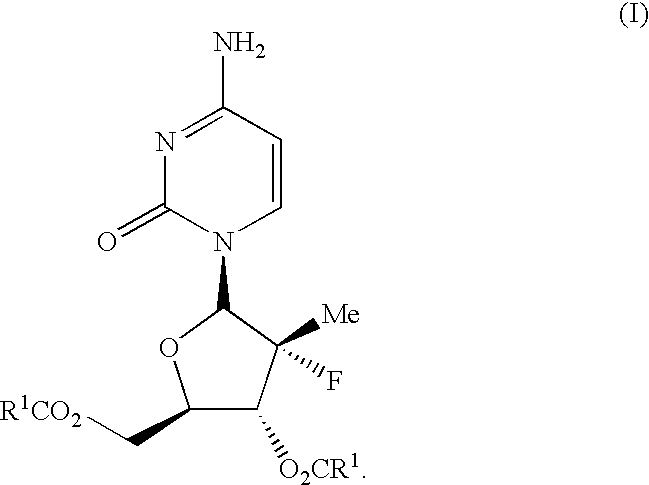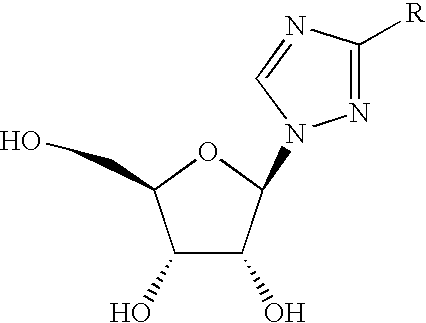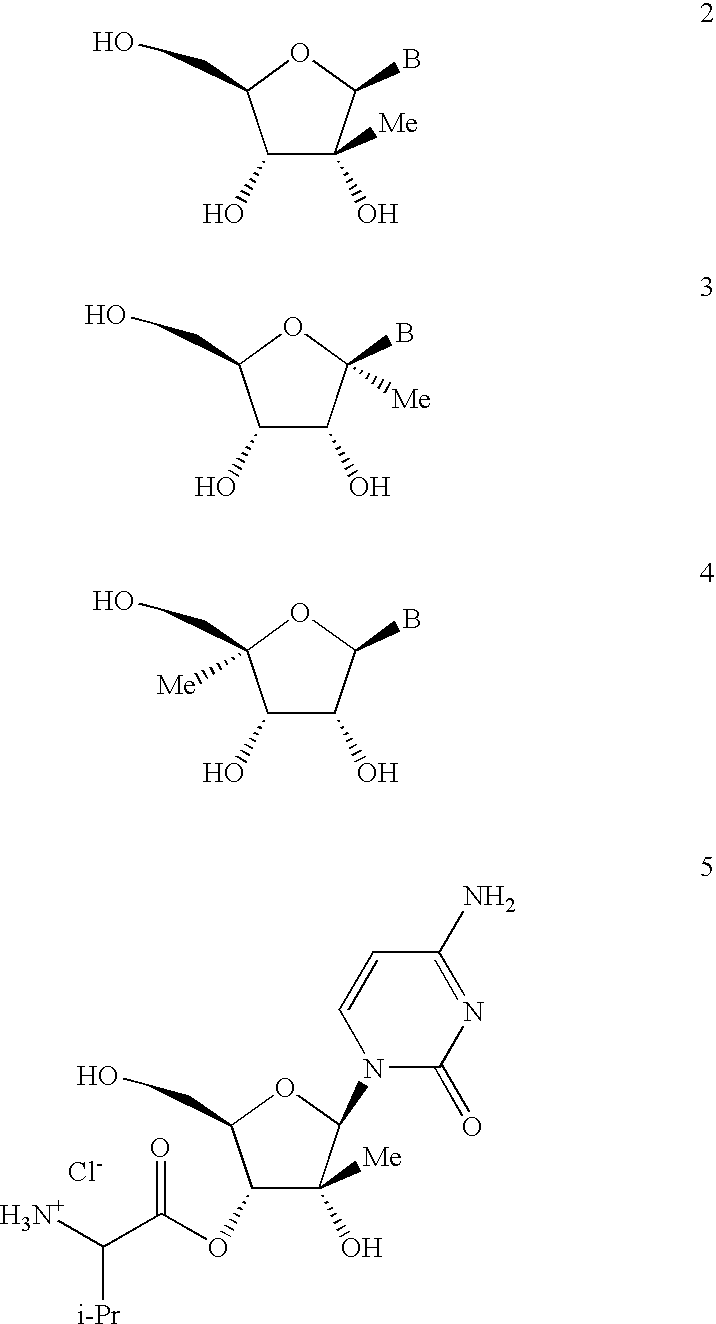Antiviral nucleosides
a nucleoside and antiviral technology, applied in the field of acylated nucleosides, can solve the problems of limited clinical benefit, ribavirin also exhibits significant toxicity, is known to induce anemia, and has a limited clinical effect,
- Summary
- Abstract
- Description
- Claims
- Application Information
AI Technical Summary
Benefits of technology
Problems solved by technology
Method used
Image
Examples
example 1
Propionic acid (2R,3R,4R,5R)-5-(4-amino-2-oxo-2H-pyrimidin-1-yl)-4-fluoro-4-methyl-3-propionyloxy-tetrahydro-furan-2-ylmethyl ester (I-3)
[0118]
[0119]To a suspension of I-6 (30 g, 0.116 mol), DMAP (1.4 g, 11.57 mmol) in THF (300 mL) and water (150 mL) was added TEA (35.1 g, 0.347 mol) to obtain a clear solution (pH about 11). The reaction mixture was cooled to 5-10° C. and propionic anhydride (30.1 g, 0.231 mol) was added dropwise to the stirred biphasic reaction. The pH was monitored and maintained at about 11-12 by simultaneous addition of KOH solution. The progress of the reaction was monitored by HPLC analysis and after the propionyl chloride was added there was about 52% of the diester, 30% monoesters and 15% starting material. Additional propionic anhydride (45.2 g, 0.347 mol) was added dropwise under the conditions described above. The reaction mixture was allowed to stand overnight without stirring. The HPLC of the organic phase indicated ca. 96% diester and ca 2% monoester. ...
example 2
Isobutyric acid (2R,3R,4R,5R)-5-(4-amino-2-oxo-2H-pyrimidin-1-yl)-4-fluoro-3-isobutyryloxy-4-methyl-tetrahydro-furan-2-ylmethyl ester (I-2)
[0120]
[0121]To an ice-cold suspension of I-6 (970 g, 3.74 mol) and DMAP (50 g, 0.412 mol) in THF (10 L). was added TEA (2.3 kg, 16.5 mol) and water (7 L) which produced a clear solution. Isobutyryl chloride (3 equivalents) was added slowly to the stirred mixture while maintaining the temperature at ca. 0° C. An additional 1.2 then 0.7 equivalents of isobutytyl chloride was added until the HPLC indicated the reaction had proceeded essentially to completion (a total of ca. 1.95 kg). The reaction mixture was acidified with con HCl to a pH of ca 6.4 and the organic phase was washed with EtOAc (2×10 L). The combined extracts were washed with water (1×15 L). The organic phase is filtered and concentrated in vacuo. The residue was dissolved in IPA (ca. 20 kg) and heptane (14.2 kg) was added. The solution was heated to ca. 74-75° C. to produce a clear so...
example 3
Carbonic acid (2R,3R,4R,5R)-5-(4-amino-2-oxo-2H-pyrimidin-1-yl)-4-fluoro-2-isobutoxycarbonyloxymethyl-4-methyl-tetrahydro-furan-3-yl ester isobutyl ester (I-4)
[0122]
[0123]A suspension of I-6 (700 mg), DMAP (33 mg) in THF (7 mL) was diluted with brine (7 mL). Dilute NaOH was added until the pH was ca. 11. The reaction mixture was cooled in an ice bath and isobutyl chloroformate (1.11 g) is added dropwise to the stirred biphasic reaction mixture maintaining pH at about 11 by addition of NaOH as required. HPLC analysis indicated mostly dicarbonate contaminated with ca. 15% of monocarbonates. An added additional 1 eq. of isobutyl chloroformate was added dropwise to the ice-cold solution. The HPLC indicated nearly complete conversion. The resulting mixture was allowed to stand overnight at RT. EtOAc (ca. 50 mL) was added and the pH of the aqueous phase is adjusted to ca. 7.5 with con HCl. The phases were separated and the organic phase was washed with water (3×) and evaporated to dryness...
PUM
| Property | Measurement | Unit |
|---|---|---|
| pH | aaaaa | aaaaa |
| pH | aaaaa | aaaaa |
| solubility | aaaaa | aaaaa |
Abstract
Description
Claims
Application Information
 Login to View More
Login to View More - R&D
- Intellectual Property
- Life Sciences
- Materials
- Tech Scout
- Unparalleled Data Quality
- Higher Quality Content
- 60% Fewer Hallucinations
Browse by: Latest US Patents, China's latest patents, Technical Efficacy Thesaurus, Application Domain, Technology Topic, Popular Technical Reports.
© 2025 PatSnap. All rights reserved.Legal|Privacy policy|Modern Slavery Act Transparency Statement|Sitemap|About US| Contact US: help@patsnap.com



